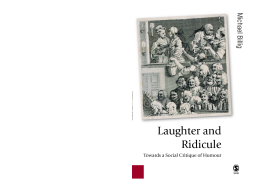
Additional Information
Book Details
Abstract
'From Thomas Hobbes' fear of the power of laughter to the compulsory, packaged -fun- of the contemporary mass media, Billig takes the reader on a stimulating tour of the strange world of humour. Both a significant work of scholarship and a novel contribution to the understanding of the humourous, this is a seriously engaging book' - David Inglis, University of Aberdeen This delightful book tackles the prevailing assumption that laughter and humour are inherently good. In developing a critique of humour the author proposes a social theory that places humour - in the form of ridicule - as central to social life. Billig argues that all cultures use ridicule as a disciplinary means to uphold norms of conduct and conventions of meaning. Historically, theories of humour reflect wider visions of politics, morality and aesthetics. For example, Bergson argued that humour contains an element of cruelty while Freud suggested that we deceive ourselves about the true nature of our laughter. Billig discusses these and other theories, while using the topic of humour to throw light on the perennial social problems of regulation, control and emancipation.
Table of Contents
| Section Title | Page | Action | Price |
|---|---|---|---|
| 1.Introduction | |||
| Tina Wallace and Fenella Porter | |||
| Section One – A Perfect Storm | |||
| 2.Development from the ground: A worm’s eye view | |||
| Stan Thekaekara | |||
| 3.Evaluation, complexity, uncertainty – theories of change and some alternatives | |||
| Chris Mowles | |||
| 4. Losing Sight of our Purpose? | |||
| Suzanne Walker | |||
| 5. Can girls save the world? | |||
| Kate Grosser and Nikki van der Gaag | |||
| 6. Lost in Translation: Gender Mainstreaming in Afghanistan | |||
| Anastasiya Hozyainova | |||
| 7. Insulating the Developing Classes | |||
| Tom Scott-Smith | |||
| 8. Reconnecting Development Policy, People and History | |||
| David Lewis | |||
| Section Two – Changing conversations | |||
| 9. Taking our lead from reality - an open practice for social development | |||
| David Harding | |||
| 10. Women on wheels | |||
| Meenu Vadera | |||
| 11.Too young to be women, too old to be girls: The [Un]Changing Aid landscape and the reality of girls at risk | |||
| Seri Wendoh | |||
| 12. Looking Beyond the Numbers: reducing violence against women in Ghana | |||
| Kanwal Ahluwalia | |||
| 13. From local to global and back again – learning from Stepping Stones | |||
| Alice Welbourn | |||
| 14.Peace Practice Examined | |||
| Bridget Walker | |||
| 15. I don’t know ... and related thoughts | |||
| Ashish Shah | |||
| 16.Apolitical stories of sanitation and suffering women | |||
| Deepa Joshi | |||
| 17.Conclusion | |||
| Tina Wallace |
